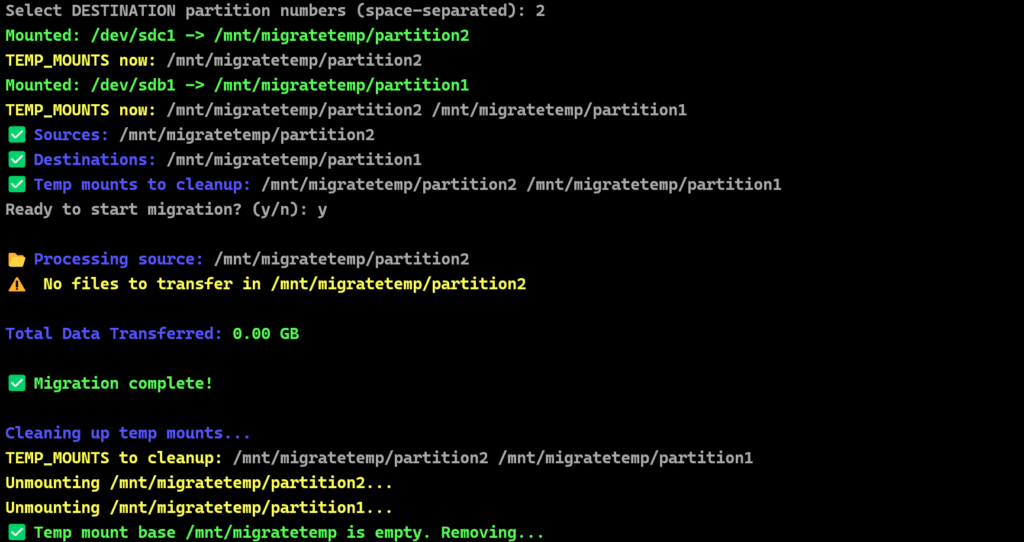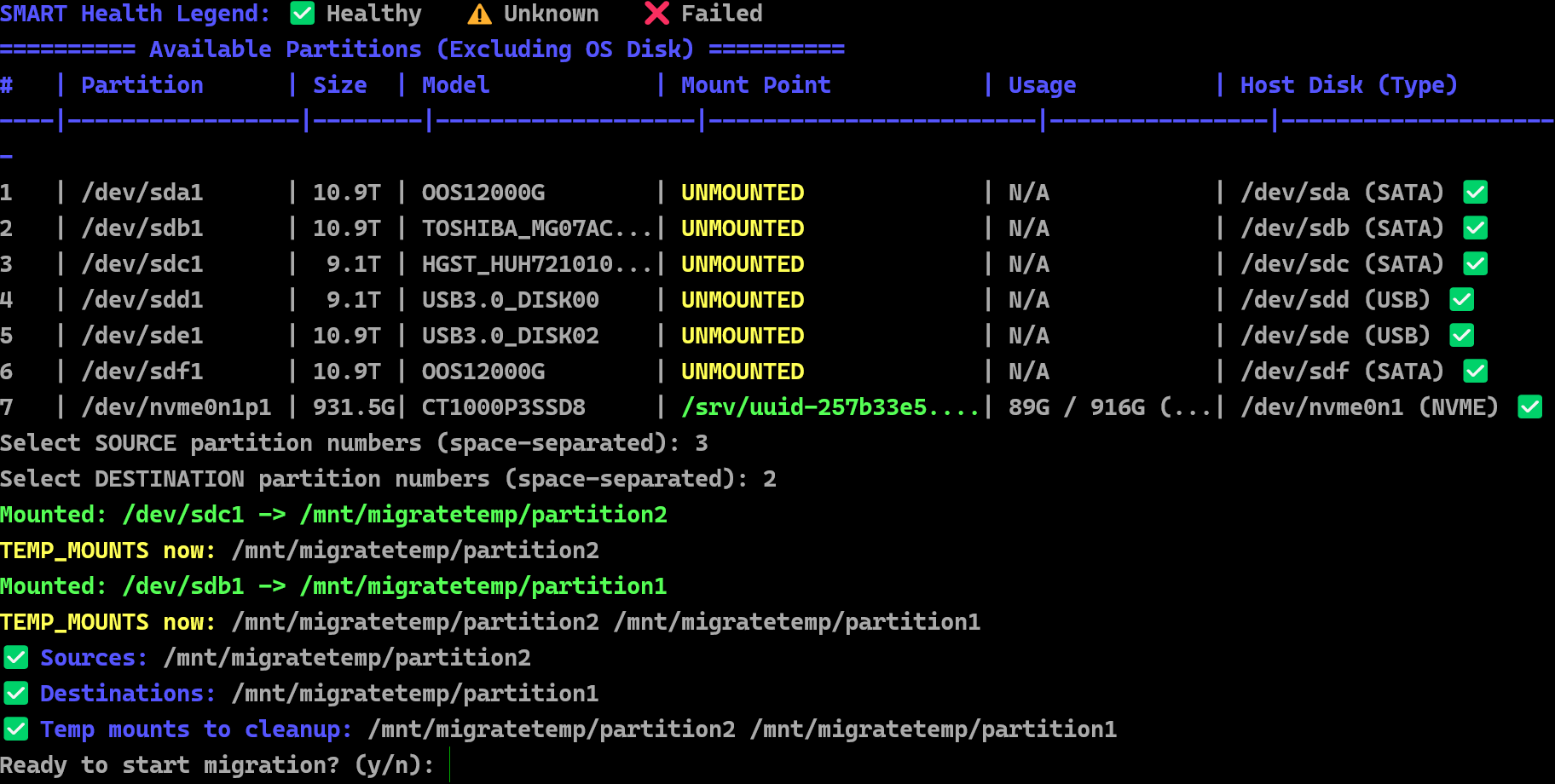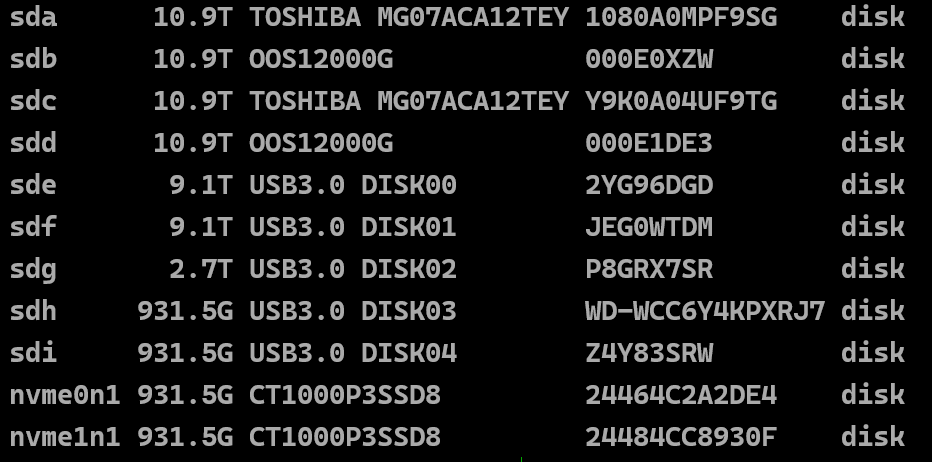My main server at home has a simple 48TB mergerfs pool where my non-critical data is stored. In the past, I’ve just manually run rsync to move data over. This time, I opted to put together a script to make the process a little easier.
Disclaimer: I can’t stand AI, but in the past month or two, I’ve found ChatGPT4 (which I’ve now decided to call SKYNET moving forward) pretty handy for creating quick scripts like this so most of this was generated and sculpted by wasting tremendous environmental resources instead of investing the time to Google and come up with what I wanted by hand. That said, getting a script to perform and appear exactly as you envision still involves a lot of back and forth to get dialed in.
I downed all of my Docker containers that reference the mount point of my mergerfs pool, then used the following script to migrate data from the old 10TB drives to the new 12TB drives. The script offers the user the ability to save a log file, then presents all attached storage devices to the user with assigned numbers. The user chooses the drive(s) they’d like to migrate from, then the drive(s) to migrate to. We’re moving the contents of partitions here, not cloning the disks themselves.
Since my workflow sometimes involves connecting a drive via USB enclosure, the script will also tell you how the drive is connected (SATA, NVME, USB) and run a quick check with smartmontools to give an indicator of the drive’s perceived health status. If the partitions selected are not yet mounted, it will create a temporary mount path for the transfer.
Afterward, I’ll remove the now-empty drives and repopulate the mergerfs pool with the appropriate disk UUIDs, then run a balance & deduplicate and bring my Docker containers back online. One note: This script will only unmount file systems that it mounts during the execution. If you’re migrating to or from a mounted file system, you’ll have to unmount it yourself.
I ended up calling this “DiskHopper” and putting it on GitHub if you prefer to grab it that way. Original script below, just don’t forget to chmod +x!

#!/bin/bash
RSYNC_OPTS="-aAXH --whole-file --inplace --no-compress --info=stats2"
TEMP_MOUNT_BASE="/mnt/migratetemp"
TEMP_MOUNTS=()
LOG_ENABLED=false
LOG_FILE=""
RED='\033[1;31m'
GREEN='\033[1;32m'
YELLOW='\033[1;33m'
BLUE='\033[1;34m'
NC='\033[0m'
cleanup() {
echo -e "\n${BLUE}Cleaning up temp mounts...${NC}"
echo -e "${YELLOW}TEMP_MOUNTS to cleanup:${NC} ${TEMP_MOUNTS[*]}"
for mnt in "${TEMP_MOUNTS[@]}"; do
echo -e "${YELLOW}Unmounting $mnt...${NC}"
sudo umount "$mnt" 2>/dev/null
sudo rmdir "$mnt" 2>/dev/null
done
if [ -d "$TEMP_MOUNT_BASE" ]; then
if [ -z "$(ls -A "$TEMP_MOUNT_BASE")" ]; then
echo -e "${GREEN}✅ Temp mount base $TEMP_MOUNT_BASE is empty. Removing...${NC}"
sudo rmdir "$TEMP_MOUNT_BASE"
else
echo -e "${RED}⚠️ Warning:${NC} $TEMP_MOUNT_BASE is not empty after cleanup."
echo -e "${RED}⚠️ You may need to investigate or manually clean it up.${NC}"
echo -e "${YELLOW}Suggested command:${NC} sudo rm -rf $TEMP_MOUNT_BASE/*"
fi
fi
}
trap cleanup SIGINT
log() {
if $LOG_ENABLED; then
echo -e "$@" >> "$LOG_FILE"
fi
}
get_os_disks() {
ROOT_DEV=$(findmnt -n -o SOURCE /)
EFI_DEV=$(findmnt -n -o SOURCE /boot/efi 2>/dev/null)
ROOT_DISK=$(lsblk -no PKNAME "$ROOT_DEV")
EFI_DISK=$(lsblk -no PKNAME "$EFI_DEV" 2>/dev/null)
echo "$ROOT_DISK $EFI_DISK" | tr ' ' '\n' | sort -u | grep -v '^$'
}
get_smart_status() {
local disk="$1"
if smartctl -H "$disk" &>/dev/null; then
health=$(smartctl -H "$disk" | grep "SMART overall-health" | awk '{print $NF}')
case "$health" in
PASSED) echo "✅" ;;
FAILED) echo "❌" ;;
*) echo "⚠️" ;;
esac
else
echo "⚠️"
fi
}
truncate_text() {
local text="$1"
local length="$2"
if [ ${#text} -gt $length ]; then
echo "${text:0:$(($length - 3))}..."
else
printf "%-${length}s" "$text"
fi
}
list_partitions() {
OS_DISKS=($(get_os_disks))
PARTITION_LIST=()
echo -e "${BLUE}SMART Health Legend:${NC} ✅ Healthy ⚠️ Unknown ❌ Failed"
echo -e "${BLUE}========== Available Partitions (Excluding OS Disk) ==========${NC}"
printf "${BLUE}%-4s| %-15s| %-6s| %-17s| %-22s| %-15s| %-22s${NC}\n" \
"#" "Partition" "Size" "Model" "Mount Point" "Usage" "Host Disk (Type)"
printf "${BLUE}%s\n${NC}" "----|-----------------|--------|-------------------|------------------------|----------------|------------------------"
local count=1
while read -r line; do
eval "$line"
PARTITION="/dev/$NAME"
PARENT="/dev/$PKNAME"
if printf '%s\n' "${OS_DISKS[@]}" | grep -q -w "$PKNAME"; then continue; fi
if [ -z "$PKNAME" ]; then continue; fi
TRANSPORT=$(lsblk -dn -o TRAN "$PARENT")
[ -z "$TRANSPORT" ] && TRANSPORT="unknown"
SMART_ICON=$(get_smart_status "$PARENT")
MOUNT_POINT=$(lsblk -nr -o MOUNTPOINT "$PARTITION" | grep '/' || echo "UNMOUNTED")
SHORT_MOUNT="$MOUNT_POINT"
if [[ "$MOUNT_POINT" =~ ^/srv/dev-disk-by-uuid- ]]; then
UUID=$(echo "$MOUNT_POINT" | sed 's|/srv/dev-disk-by-uuid-||')
SHORT_MOUNT="/srv/uuid-${UUID:0:8}...${UUID: -8}"
elif [[ ${#MOUNT_POINT} -gt 22 ]]; then
SHORT_MOUNT="${MOUNT_POINT:0:19}..."
fi
PARTITION_SIZE=$(lsblk -n -o SIZE "$PARTITION")
if [[ "$MOUNT_POINT" != "UNMOUNTED" ]]; then
USAGE_INFO=$(df -h --output=used,size,pcent "$MOUNT_POINT" | tail -1 | awk '{print $1" / "$2" ("$3")"}')
MOUNT_COLOR=$GREEN
else
USAGE_INFO="N/A"
MOUNT_COLOR=$YELLOW
fi
MODEL=$(udevadm info --query=all --name="$PARENT" | grep "ID_MODEL=" | cut -d= -f2)
[[ -z "$MODEL" ]] && MODEL="Unknown"
printf "%-4s| %-15s| %-6s| %-17s| ${MOUNT_COLOR}%-22s${NC}| %-15s| %-22s\n" \
"$count" "$(truncate_text "$PARTITION" 15)" "$(truncate_text "$PARTITION_SIZE" 6)" \
"$(truncate_text "$MODEL" 17)" "$(truncate_text "$SHORT_MOUNT" 22)" \
"$(truncate_text "$USAGE_INFO" 15)" "$(truncate_text "$PARENT (${TRANSPORT^^}) $SMART_ICON" 22)"
PARTITION_LIST+=("$PARTITION")
((count++))
done < <(lsblk -P -o NAME,SIZE,MODEL,PKNAME | grep -v "loop")
export PARTITION_LIST
}
select_partitions() {
local prompt=$1
local result_var=$2
read -p "Select $prompt partition numbers (space-separated): " -a selection
eval "$result_var=(${selection[@]})"
}
ensure_mounted() {
local partition=$1
local index=$2
local temp_mount="$TEMP_MOUNT_BASE/partition$index"
sudo mkdir -p "$temp_mount"
sudo mount "$partition" "$temp_mount" || {
echo -e "${RED}❌ Failed to mount $partition. Exiting.${NC}"
exit 1
}
echo "$temp_mount"
}
migrate_data() {
local total_bytes_moved=0
for src in "${SOURCE_MOUNTS[@]}"; do
echo -e "\n📂 ${BLUE}Processing source:${NC} $src"
log "Processing source: $src"
mapfile -t items < <(find "$src" -mindepth 1 -maxdepth 1)
if [ ${#items[@]} -eq 0 ]; then
echo -e "${YELLOW}⚠️ No files to transfer in $src${NC}"
log "No files to transfer in $src"
continue
fi
for item in "${items[@]}"; do
dst="${DEST_MOUNTS[$((RANDOM % ${#DEST_MOUNTS[@]}))]}"
echo -e "➡️ ${BLUE}Copying${NC} $(basename "$item") ${BLUE}to${NC} $dst"
log "Copying $(basename "$item") to $dst"
RSYNC_OUTPUT=$(rsync $RSYNC_OPTS "$item" "$dst"/)
result=$?
echo "$RSYNC_OUTPUT"
transferred_bytes=$(echo "$RSYNC_OUTPUT" | grep "Total transferred file size:" | awk '{print $5}')
if [[ "$transferred_bytes" =~ ^[0-9]+$ ]]; then
total_bytes_moved=$((total_bytes_moved + transferred_bytes))
fi
if [ $result -eq 0 ]; then
echo -e "${GREEN}✅ rsync OK, removing source:${NC} $(basename "$item")"
log "✅ rsync OK, removing source: $(basename "$item")"
rm -rf "$item"
else
echo -e "${RED}❌ rsync failed:${NC} $item"
log "❌ rsync failed: $item"
echo -e "${YELLOW}Cleaning up failed destination...${NC}"
rm -rf "$dst/$(basename "$item")"
log "Cleaned up destination: $dst/$(basename "$item")"
fi
done
done
total_gb_moved=$(awk "BEGIN {printf \"%.2f\", $total_bytes_moved / (1024*1024*1024)}")
echo -e "\n${BLUE}Total Data Transferred:${NC} ${GREEN}${total_gb_moved} GB${NC}"
log "Total Data Transferred: ${total_gb_moved} GB"
}
# ===== MAIN =====
clear
echo -e "${BLUE}=== Partition-Based Data Migration Tool ===${NC}"
LOG_DIR="$(pwd)"
LOG_FILE="$LOG_DIR/migration-log-$(date +%F_%H-%M-%S).txt"
echo
echo -e "${BLUE}Enable logging to file? (y/n):${NC}"
echo -e "Logs will be saved to: ${YELLOW}${LOG_FILE}${NC}"
read -p "> " LOG_CHOICE
if [[ "$LOG_CHOICE" == "y" ]]; then
LOG_ENABLED=true
echo "Logging to $LOG_FILE"
echo "Migration Log - $(date)" > "$LOG_FILE"
fi
list_partitions
select_partitions "SOURCE" SOURCE_SELECTION
select_partitions "DESTINATION" DEST_SELECTION
SOURCE_MOUNTS=()
for num in "${SOURCE_SELECTION[@]}"; do
index=$((num-1))
partition="${PARTITION_LIST[$index]}"
mount_point=$(ensure_mounted "$partition" "$index")
echo -e "${GREEN}Mounted: $partition -> $mount_point${NC}"
SOURCE_MOUNTS+=("$mount_point")
TEMP_MOUNTS+=("$mount_point")
echo -e "${YELLOW}TEMP_MOUNTS now:${NC} ${TEMP_MOUNTS[*]}"
done
DEST_MOUNTS=()
for num in "${DEST_SELECTION[@]}"; do
index=$((num-1))
partition="${PARTITION_LIST[$index]}"
mount_point=$(ensure_mounted "$partition" "$index")
echo -e "${GREEN}Mounted: $partition -> $mount_point${NC}"
DEST_MOUNTS+=("$mount_point")
TEMP_MOUNTS+=("$mount_point")
echo -e "${YELLOW}TEMP_MOUNTS now:${NC} ${TEMP_MOUNTS[*]}"
done
echo -e "${BLUE}✅ Sources:${NC} ${SOURCE_MOUNTS[*]}"
echo -e "${BLUE}✅ Destinations:${NC} ${DEST_MOUNTS[*]}"
echo -e "${BLUE}✅ Temp mounts to cleanup:${NC} ${TEMP_MOUNTS[*]}"
read -p "Ready to start migration? (y/n): " CONFIRM
if [[ "$CONFIRM" != "y" ]]; then
echo -e "${RED}Exiting.${NC}"
cleanup
exit 0
fi
migrate_data
echo -e "\n${GREEN}✅ Migration complete!${NC}"
log "✅ Migration complete!"
cleanup

